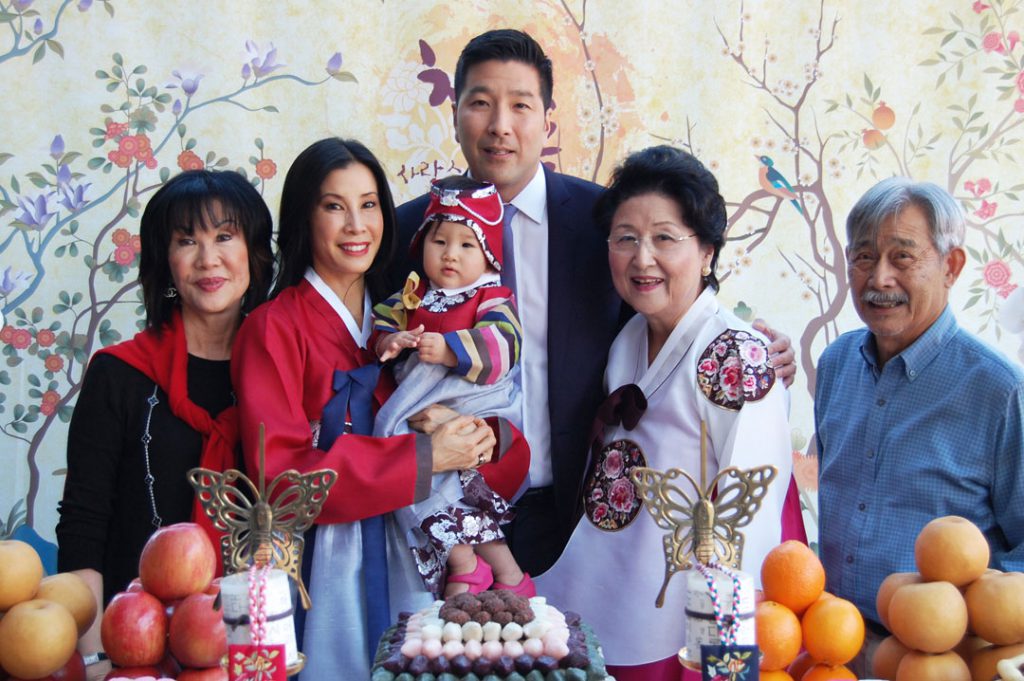by PAUL SONG
(Above photo: Paul Song and wife Lisa Ling celebrate the one-year birthday of their daughter Jett, along with Mary Ling (Lisa’s mother, far left), Grace Eun Hyung Kim (Paul’s mother) and Doug Ling (Lisa’s father), March, 2014.)
June marks the first ever Immigrant Heritage Month, organized by a new nonprofit called Welcome.us. There is one simple focus: encouraging all individuals to share our own immigrant experiences. It will help serve as a reminder that our strength as a country is a direct result of the diversity within our borders.
I know that I draw great strength, and a large part of my identity, from my immigrant background and the set of circumstances that led my family to these shores. Today, I am an oncologist, health care activist and biotech executive who works to improve the health of everyone. As the executive chairman of the Courage Campaign, a progressive online organization of over 900,000 active members, I am also committed to fighting for the least among us and for human rights for all. And, on a more personal level, I play the very important roles of husband, father and son in my Asian American family.
Paul Song with his parents,
Grace Eun Hyung Kim and Won Ryul Song, 2007.
It’s a family whose story, on my side, begins more than 60 years ago, when my mom came to the United States via freightliner from Busan in 1951. She was a Korean War refugee from Seoul whose family had been displaced when the communists overtook their city. By the grace of God and the Herculean efforts of my mom’s older sister, who was already studying in the U.S., my mom was fortunate enough to receive a scholarship to study in New York.
The tremendous draw to the United States and what it stood for was not new. Prior to the war, my aunt had always dreamed of coming to the U.S. to study, but my grandfather would only allow her to go if she learned to speak perfect English. Determined, she studied every day before school with a prominent American Presbyterian missionary, Lillias Underwood. Tragically, Mrs. Underwood was assassinated by communists in 1949. In her honor, a memorial scholarship was established for one Korean student to study in the U.S., and my aunt was the very first recipient. She was studying at Hood College in Maryland when the Korean War broke out and was asked to speak to various American churches, which wanted to know more about her homeland. It was during one of these presentations that a group offered to help my mom with a full scholarship.
My mom would eventually go on to receive a master’s degree from Columbia Teacher’s College in early childhood education, with a focus on Head Start, a federal program that provides early childhood education for low-income families. She figured that if she ever did return to Korea, that there would be tremendous poverty and a real need for a similar program.
She spent her early professional years at the Mt. Cavalry Child Care Center in Harlem, New York, under the guidance of an amazing woman whose own American story helped define an entire generation. Shirley Chisholm, who would later become the first African American woman elected to Congress, mentored my mom and later sponsored her, as she sought to earn a green card. Chisholm later endorsed my mom to become the education director for the entire Newark, New Jersey, Head Start program.
In 1958, my mom met my father, a native of Pyongyang. His family had lost everything when they fled to the South before the start of the Korean War. He served in the South Korean Navy during the war and, after graduating from Yonsei University, would come to the U.S. to complete his Ph.D. in chemistry. They would marry in 1959.
Their original intent was to go back and help rebuild their homeland. And, just as they were beginning to build a life together in the U.S., the struggles of the past were never too far away.
Song’s grandfather, Sang Don Kim, 1961.
In 1960, my late maternal grandfather, Sang Don Kim, would become the first democratically elected mayor of Seoul. Unfortunately, he was swept up in a military coup in 1961 and thrown in jail. Despite numerous attempts by the military, he was found not guilty and released five months later, but placed under house arrest and barred from future politics. He would eventually be exiled to the U.S. and never allowed to return. My family did not set foot again in Korea until 1992 when democracy was fully restored.
Through all of this, my parents, and eventually my younger sister and I, called the United States home. My parents were forever grateful to their adopted country and strived to build a life worthy of pride and to give something back.
My family’s journey is not without some pain, but I know this history deeply influenced my early years and my overall development into the person I am today.
The United States is made up of so many stories like my family’s. In this first ever Immigrant Heritage Month, I encourage all of us to share our stories that collectively make this country richer and greater.
Please visit Welcome.us to learn more.
Photos courtesy of Paul Song.







